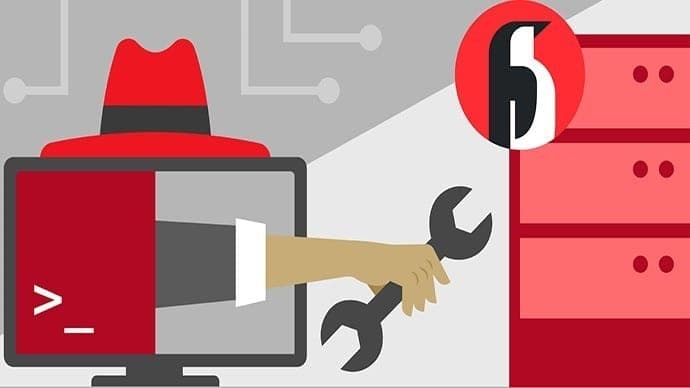Student Feedback
XK0-005: CompTIA Linux+ Certification Video Training Course Outline
Introduction
Basic Linux Tasks
Users and Groups
Permissions and Ownership
Storage
Files and Directories
Kernel Modules
The Linux Boot Process
System Components
Devices
Networking
Packages and Software
Securing Linux Systems
Bash Scripting
Task Automation
Conclusion
Introduction
XK0-005: CompTIA Linux+ Certification Video Training Course Info
Linux+ XK0-005 Full Course – Learn Linux Administration & Security
Professional Certification Readiness Course
What you will learn from this course
• Install, configure, and maintain Linux operating systems for enterprise and cloud environments
• Use package management tools to install, update, and remove software applications
• Control and monitor services and processes running on Linux servers
• Perform key Linux system maintenance tasks such as backups, recovery, kernel updates, and file system administration
• Execute administrative tasks using the Linux command line efficiently
• Utilize powerful command-line utilities for troubleshooting and diagnostics
• Develop and run shell scripts to automate system management and routine tasks
• Create and manage disk partitions and various Linux file systems
• Set and manage file permissions, access control, and ownership for secure data management
• Configure and manage Linux hardware devices, including storage drives and network interfaces
• Understand core networking concepts, IP addressing, and essential protocols
• Configure network settings, services, and interfaces on Linux systems
• Identify and resolve common network issues in Linux environments
• Apply Linux security practices, including user authentication, encryption, and system hardening
Learning Objectives
The primary objective of this course is to provide a complete understanding of Linux system administration and prepare learners for the CompTIA Linux+ XK0-005 certification exam. By the end of this training, participants will be able to confidently manage Linux systems, perform administrative tasks from the command line, and troubleshoot common problems that arise in a professional IT environment. The course aims to help learners master essential Linux skills such as package management, disk partitioning, process control, and system security. It also focuses on real-world scenarios that require practical problem-solving and automation skills using shell scripts. Students will gain the expertise needed to configure Linux servers, manage users and groups, maintain secure systems, and handle networking tasks. This course also develops critical thinking abilities required for system troubleshooting and performance optimization. The goal is to ensure participants have the knowledge to install and configure Linux distributions, manage system resources, and secure Linux systems according to industry best practices.
Target Audience
This course is designed for IT professionals who want to build or advance their careers in Linux system administration. It is ideal for system administrators responsible for deploying and managing Linux servers in corporate or cloud environments. DevOps engineers who work with Linux in continuous integration and continuous deployment pipelines will benefit from the automation and scripting sections of the course. Network administrators who manage Linux-based networking devices and services will find the networking and security modules valuable. Cybersecurity professionals who need to secure Linux servers and protect critical infrastructure will also gain important skills from this training. Technical support specialists responsible for troubleshooting Linux-based applications and services will improve their ability to diagnose and fix system issues. This course is also suitable for IT professionals who are transitioning from other operating systems to Linux or who want to expand their technical expertise to include open-source environments.
Requirements
There are no strict requirements to enroll in this course, making it accessible to a wide range of learners. However, a basic understanding of IT concepts, operating system fundamentals, and computer networking will help students progress more effectively. Previous experience using Linux in a personal or professional environment is recommended but not mandatory. Learners should be comfortable using a computer, navigating operating systems, and working with basic command-line tools. Access to a Linux environment, either through a virtual machine or dedicated hardware, is highly encouraged to practice the skills taught throughout the course.
Prerequisites
While no formal prerequisites are required, candidates will benefit from having some hands-on experience with Linux commands and system administration tasks before starting the course. Familiarity with basic IT terminology, networking fundamentals, and file management concepts will provide a strong foundation for learning. Students who have previously used Linux-based distributions such as Ubuntu, CentOS, Debian, or Fedora will find it easier to understand the topics covered. A basic understanding of how operating systems manage files, processes, and hardware resources will also be helpful. For those preparing for the CompTIA Linux+ XK0-005 exam, it is recommended to dedicate time to practicing command-line operations and reviewing fundamental networking and security concepts alongside this course to reinforce learning outcomes.
Course Overview
CompTIA Linux+ XK0-005 is a globally recognized certification that validates the skills required to manage Linux systems in professional IT environments. This course is designed to provide comprehensive training for individuals seeking to earn this certification or enhance their Linux administration skills. The curriculum covers essential Linux topics,, including installation, configuration, system architecture, command-line management, shell scripting, networking, security, and troubleshooting. Unlike vendor-specific certifications, CompTIA Linux+ is vendor-neutral, ensuring that the knowledge gained applies to multiple Linux distributions and real-world enterprise environments. The course offers a balanced combination of theory and practical application, enabling learners to develop hands-on skills that can be applied in workplace scenarios. Students will learn how to install Linux operating systems, configure network services, manage user accounts, secure critical data, and automate administrative tasks using scripts. Each section of the course is designed to build confidence and technical expertise, ensuring that learners are fully prepared to pass the Linux+ certification exam and succeed in a professional Linux administration role. By mastering these concepts, participants will be equipped to handle the challenges of Linux system management in a variety of environments, including data centers, cloud infrastructures, and enterprise networks.
Course Modules / Sections
The CompTIA Linux+ XK0-005 course is divided into structured modules that carefully guide learners from foundational Linux concepts to advanced administration tasks. Each module focuses on a specific area of Linux system management and builds practical skills required for the certification exam and real-world IT environments. The first module introduces Linux system configuration and management, including installation procedures, hardware requirements, and system architecture. Students learn how to set up Linux operating systems on physical servers and virtual machines, configure essential services, and perform ongoing system maintenance. The second module focuses on the Linux command line, which is the backbone of Linux administration. This section teaches students how to use command-line tools, create shell scripts, and work with regular expressions for text processing and automation. The third module covers filesystems and devices, exploring how Linux handles storage devices, disk partitioning, mounting, and file system integrity. Learners will gain skills in managing storage space, configuring file systems, and ensuring data reliability. The fourth module addresses networking concepts and Linux network configuration. Topics include IP addressing, routing, essential network services, and network troubleshooting techniques. The fifth module focuses on Linux security, including user and group management, permission models, encryption, firewall configuration, and system hardening techniques to protect against security threats. The final module emphasizes scripting and automation, teaching students to write and execute shell scripts to simplify administrative tasks, automate updates, and manage system resources efficiently. These modules are designed to develop a comprehensive understanding of Linux, ensuring that students not only pass the CompTIA Linux+ exam but also gain the confidence to manage Linux systems in production environments.
Key Topics Covered
The course provides an in-depth exploration of essential Linux administration topics that are critical for system administrators, DevOps engineers, and IT professionals. Key topics begin with Linux installation and system setup, where students learn how to install different distributions, manage boot loaders, and configure system parameters. Package management is another vital topic, covering tools such as APT, YUM, and DNF to install, update, and remove software packages efficiently. System maintenance is thoroughly addressed, including tasks such as performing kernel upgrades, configuring scheduled jobs with cron, managing backups, and recovering data in case of failures. Command-line operations form a core part of the course, teaching students how to navigate the file system, manipulate files and directories, use pipes and redirections, and combine commands for complex tasks. Shell scripting and automation are explored in detail, including writing Bash scripts, using variables and loops, handling errors, and creating reusable scripts for administrative tasks. The course also covers file system management, including disk partitioning, formatting, mounting, and monitoring disk usage. File permissions and ownership are key security features in Linux, and students learn how to configure read, write, and execute permissions to secure data effectively. Networking topics include IP configuration, subnetting, DNS, DHCP, SSH, and firewall management using tools like iptables and firewalld. Security concepts are integrated throughout the course, covering user authentication, password policies, encryption methods, and intrusion detection. System troubleshooting and diagnostics are emphasized with training on log analysis, process monitoring, performance tuning, and identifying hardware or software failures. Each of these topics is presented with practical demonstrations to ensure that students can apply their knowledge in real-world scenarios.
Teaching Methodology
This course uses a blended teaching methodology designed to combine theoretical knowledge with practical, hands-on experience. Interactive video lectures introduce key Linux concepts, explain system processes, and guide learners through command-line operations. The lectures are structured to simplify complex topics and make them easy to understand, even for learners who are new to Linux. Step-by-step demonstrations show how to execute Linux commands, configure services, and implement security measures in real-time. Practical lab sessions form an essential component of the course, allowing students to practice each concept in a controlled environment. These labs simulate real-world Linux administration tasks, such as installing software packages, setting up network services, and managing file permissions. Students are encouraged to complete lab exercises on virtual machines or cloud-based Linux instances to build confidence in applying their skills. The course also provides scenario-based exercises where learners must solve practical problems, such as troubleshooting network issues or securing a Linux server. This hands-on approach reinforces theoretical concepts and helps learners develop the critical thinking and problem-solving skills required for professional Linux administration. To support continuous learning, the course includes downloadable resources, command references, and practice exercises that allow students to review key topics at their own pace. The teaching methodology emphasizes active engagement, ensuring that learners not only understand Linux theory but also develop the ability to apply their knowledge in professional IT environments.
Assessment & Evaluation
Assessment and evaluation in this course are designed to measure both theoretical understanding and practical competency. Throughout the course, students complete a series of quizzes and knowledge checks that reinforce key concepts and help track progress. These assessments focus on critical topics such as command-line operations, system configuration, package management, and security practices. Practical lab exercises serve as another key component of the evaluation process. Each lab requires students to perform real administrative tasks, such as configuring network interfaces, creating shell scripts, or setting file permissions. These labs are assessed based on accuracy, efficiency, and adherence to best practices. At the end of each module, students complete a comprehensive practice test that simulates the format and difficulty of the CompTIA Linux+ XK0-005 exam. These tests are designed to help learners identify areas that require further study and to build the confidence needed to pass the certification exam. In addition to self-assessments and practice tests, students are encouraged to complete project-based tasks that involve configuring and managing a fully functional Linux environment. These projects require the integration of multiple skills, such as networking, security, and automation, providing a realistic measure of a student’s readiness for professional Linux administration roles. Performance in these assessments ensures that learners not only gain the knowledge needed to succeed in the certification exam but also develop the practical skills required to excel in real-world IT environments. By combining quizzes, labs, practice tests, and projects, the course provides a comprehensive evaluation framework that prepares students for both the CompTIA Linux+ exam and future career opportunities in Linux system administration.
Benefits of the Course
Enrolling in the CompTIA Linux+ XK0-005 course provides a wide range of benefits for IT professionals looking to advance their careers in Linux system administration, DevOps, security, and networking. The course equips learners with practical, hands-on skills that are immediately applicable in real-world environments, making them more effective and confident in managing Linux systems. One of the key benefits is gaining a comprehensive understanding of Linux system architecture, command-line operations, and administration practices, which are essential for any IT professional working with open-source platforms. Students also acquire advanced troubleshooting skills that allow them to diagnose and resolve system and network issues efficiently, reducing downtime and improving operational performance. The course emphasizes automation and scripting, enabling participants to streamline repetitive tasks, increase productivity, and implement efficient system management strategies. Another significant benefit is the preparation for the CompTIA Linux+ XK0-005 certification, a globally recognized credential that demonstrates proficiency in Linux system administration to employers and peers. Earning this certification enhances career prospects, increases employability, and can lead to higher salary opportunities in the IT and cybersecurity fields. Additionally, the course promotes professional growth by teaching security best practices, helping learners implement robust security measures to protect sensitive data and maintain compliance with industry standards. Learners also gain expertise in networking, including configuring network services and troubleshooting connectivity issues, which is valuable for roles involving system integration, cloud computing, and DevOps operations. The course is structured to provide a strong foundation for continuous learning, offering knowledge that can be applied across various Linux distributions and environments, making participants versatile and adaptable in their careers.
Course Duration
The CompTIA Linux+ XK0-005 course is designed to provide comprehensive training within a structured timeframe that balances theory and practical application. The course duration typically spans approximately 40 to 60 hours of instruction, depending on the pace of the learner and the inclusion of hands-on labs and practice exercises. This duration allows sufficient time for in-depth exploration of each module, including system configuration, command-line administration, file systems and storage management, networking, security, and scripting. The course is divided into multiple sessions or units, enabling learners to progress through the material systematically while applying what they have learned in practical exercises. Self-paced learners can complete the course over a period of four to six weeks, dedicating a few hours each day to study, practice, and review. Instructor-led training programs may provide a more condensed schedule, offering intensive sessions over several days or weeks, combined with live demonstrations and guided labs. The structured course duration ensures that learners have adequate time to understand complex concepts, practice commands and scripts, and reinforce their knowledge through assessments and projects. Additionally, the duration allows for continuous review and repetition of critical topics, which is essential for exam preparation and skill retention. By completing the full course within the recommended timeframe, learners are well-prepared to confidently apply their knowledge in real-world Linux administration tasks and achieve the CompTIA Linux+ certification.
Tools & Resources Required
To maximize the learning experience and ensure practical competency, certain tools and resources are required for the CompTIA Linux+ XK0-005 course. The primary resource is a Linux environment where learners can perform hands-on exercises and practice administrative tasks. This can be set up using a physical Linux system or a virtual machine hosted on a personal computer. Popular Linux distributions for practice include Ubuntu, CentOS, Debian, and Fedora, as these distributions cover the majority of real-world Linux environments and are compatible with the concepts taught in the course. Virtualization software such as VirtualBox, VMware, or cloud-based platforms like AWS, Azure, or Google Cloud can be used to create multiple Linux instances for testing and experimentation. A reliable internet connection is necessary to access course materials, download software packages, and participate in online labs or simulations. Text editors and Integrated Development Environments (IDEs) like Vim, Nano, or Visual Studio Code are useful for writing and editing shell scripts, configuration files, and automation tasks. Additionally, students may require access to networking tools such as ping, traceroute, netstat, and iptables for network configuration and troubleshooting exercises. Supplementary resources, including course manuals, documentation, cheat sheets, and reference guides, support the theoretical and practical aspects of learning. Access to online forums, study groups, and community support can also enhance the learning experience by providing opportunities for discussion, collaboration, and problem-solving. By ensuring access to these essential tools and resources, learners can fully engage with the course content, practice skills effectively, and develop the competence required for successful Linux system administration and certification.
Career Opportunities
Completing the CompTIA Linux+ XK0-005 course opens a wide range of career opportunities for IT professionals in various industries and organizational settings. One of the most prominent career paths is that of a Linux system administrator, where individuals are responsible for managing, configuring, and maintaining Linux servers and workstations in enterprise, cloud, and hybrid environments. Professionals in this role handle essential tasks such as installing software packages, applying system updates, managing user accounts and permissions, monitoring system performance, and ensuring high availability and reliability of IT infrastructure. They are also responsible for implementing backup strategies, performing disaster recovery procedures, and maintaining compliance with organizational policies and industry regulations.
Another critical career path is that of a DevOps engineer. In this role, Linux expertise is indispensable for designing, deploying, and automating applications and services within continuous integration and continuous deployment (CI/CD) pipelines. DevOps professionals utilize their Linux skills to manage cloud-based infrastructures, automate repetitive tasks with shell scripting, and implement configuration management and orchestration tools such as Ansible, Puppet, Chef, or Terraform. They are also responsible for monitoring system performance, optimizing resource utilization, and ensuring seamless integration of applications across multiple environments. These skills make Linux+ certified professionals highly sought after in organizations that prioritize agile, automated, and efficient IT operations.
Network administrators also gain significant advantages from Linux+ training, as many networking devices, servers, and network services operate on Linux-based systems. These professionals are responsible for configuring and maintaining network interfaces, managing services such as DNS, DHCP, and VPNs, troubleshooting network connectivity issues, and ensuring secure and efficient communication channels across the organization. Their expertise in Linux allows them to deploy and manage firewalls, network monitoring tools, and security protocols that protect network infrastructure from potential vulnerabilities and cyber threats.
Cybersecurity specialists and security analysts also benefit greatly from the skills acquired through the Linux+ course. Linux servers frequently host critical applications, databases, and sensitive data, making them a primary target for cyber attacks. Professionals in security-focused roles leverage their Linux knowledge to implement robust security measures, monitor system logs for unusual activity, configure access control policies, enforce strong authentication mechanisms, and manage firewalls and intrusion detection systems. Their ability to secure Linux environments is essential for protecting organizational assets, maintaining regulatory compliance, and mitigating the risk of data breaches and cyber incidents.
Technical support engineers, IT helpdesk specialists, and system support personnel can also utilize Linux+ skills to provide efficient support for Linux-based applications and infrastructure. This includes diagnosing and resolving hardware and software issues, assisting users with command-line operations, configuring software and network services, and performing routine maintenance tasks. Their Linux proficiency enables them to respond quickly to technical problems, maintain system uptime, and ensure smooth operational continuity across multiple departments and locations.
Cloud engineers and system engineers working with platforms such as AWS, Microsoft Azure, and Google Cloud Platform benefit from Linux administration knowledge, as a significant portion of cloud services and virtual machines run on Linux distributions. Linux+ certified professionals in these roles are capable of deploying, configuring, and managing cloud-based Linux instances, optimizing resource utilization, automating cloud operations, and implementing security best practices for cloud workloads. Their skill set is crucial for organizations transitioning to cloud infrastructure and aiming to maintain secure, efficient, and scalable cloud environments.
The Linux+ course also prepares students for specialized roles such as automation engineer, infrastructure as code (IaC) engineer, and site reliability engineer (SRE), where Linux knowledge is applied to streamline IT processes, manage complex environments, and improve overall operational efficiency. These roles often require the integration of scripting, configuration management, and monitoring tools to achieve seamless automation and reliable system performance.
By completing the CompTIA Linux+ XK0-005 course, professionals gain a solid foundation for career advancement and are well-positioned to move into senior administrative roles, IT consultancy positions, technical leadership roles, or specialized positions in DevOps, cloud computing, and cybersecurity. The course equips learners with the knowledge, hands-on experience, and industry-recognized certification that demonstrates their ability to manage Linux systems effectively, troubleshoot complex issues, and implement best practices across a variety of IT environments. This combination of practical skills, theoretical understanding, and certification readiness makes graduates highly competitive in the global IT job market, opening doors to rewarding and high-demand career opportunities across multiple industries.
Conclusion
The CompTIA Linux+ XK0-005 course provides a comprehensive and practical training program for individuals seeking to develop expertise in Linux system administration and establish themselves as competent IT professionals. By covering essential topics such as installation, configuration, command-line management, networking, security, file systems, and scripting, the course equips learners with both foundational and advanced knowledge required to excel in diverse professional IT environments. Participants gain the ability to manage Linux systems efficiently, optimize performance, implement robust security measures, and troubleshoot complex system and network issues, which are critical skills for any IT infrastructure role.
Through carefully structured modules, hands-on labs, and scenario-based practical exercises, students acquire real-world experience in managing Linux systems, automating administrative tasks, and configuring network services in enterprise and cloud environments. The course emphasizes the integration of theoretical understanding with practical application, ensuring that learners are not only familiar with Linux concepts but are also capable of applying them effectively in day-to-day administrative tasks. By completing these exercises, learners develop problem-solving skills and technical confidence, preparing them to handle operational challenges in production systems and meet organizational demands.
In addition to technical skills, the course fosters professional growth by teaching best practices in system security, user management, automation, and compliance. Students learn how to implement effective security policies, manage user permissions, monitor system activity, and apply patches and updates in a secure and controlled manner. This knowledge is essential for safeguarding organizational assets, maintaining system integrity, and supporting regulatory compliance in industries that rely heavily on Linux-based systems.
The benefits of completing the CompTIA Linux+ XK0-005 course extend beyond technical proficiency. Learners enhance their employability, positioning themselves as capable IT professionals ready to take on roles such as Linux system administrators, DevOps engineers, network specialists, cloud engineers, cybersecurity analysts, and technical support specialists. The combination of Linux expertise, networking knowledge, automation skills, and security awareness makes graduates valuable assets to organizations seeking skilled professionals who can manage modern IT infrastructure efficiently and securely.
Moreover, obtaining the CompTIA Linux+ certification validates the learner’s capabilities and provides formal recognition of their skills in the global IT industry. This credential demonstrates to employers that the individual has mastered essential Linux administration competencies, understands industry best practices, and can contribute effectively to technology-driven projects and operations. It also serves as a stepping stone for career advancement, enabling professionals to pursue senior administrative roles, specialized IT positions, or further certifications in areas such as cloud computing, cybersecurity, and DevOps.
The course prepares students to adapt to evolving technology trends by teaching transferable skills applicable across multiple Linux distributions and environments. Graduates develop the confidence to manage complex IT systems, troubleshoot issues proactively, and implement automation strategies to increase operational efficiency. The hands-on experience and comprehensive knowledge gained from this course empower learners to take on challenging projects, support enterprise-scale infrastructures, and drive innovation in IT environments.
In conclusion, the CompTIA Linux+ XK0-005 course is a robust and well-rounded training program that equips IT professionals with the expertise, practical experience, and certification readiness necessary to succeed in the competitive world of Linux system administration. By completing this program, learners gain the technical and professional skills required to excel in their careers, enhance their marketability, and make meaningful contributions to their organizations. The combination of hands-on labs, real-world scenarios, and comprehensive instruction ensures that graduates are well-prepared to meet industry demands and achieve long-term success in the IT field.
Enroll Today
Enroll in the CompTIA Linux+ XK0-005 course today to begin your journey toward mastering Linux system administration and positioning yourself as a highly skilled IT professional. This course is designed to provide not only the knowledge required to pass the certification exam but also the practical, hands-on experience necessary to confidently manage Linux systems in real-world environments. By enrolling, you will gain access to a comprehensive curriculum covering Linux installation, system configuration, package management, networking, security, and automation through shell scripting. The course is structured to help you build a strong foundation in Linux administration, making you proficient in managing servers, troubleshooting issues, optimizing system performance, and implementing effective security measures.
Whether your goal is to become a system administrator responsible for maintaining enterprise servers, a DevOps engineer integrating Linux systems into automated pipelines, a network specialist managing Linux-based network devices, or a cybersecurity professional securing critical infrastructure, this course equips you with the skills and knowledge to excel. Beyond technical skills, the course fosters critical thinking and problem-solving abilities, allowing you to tackle complex challenges and implement efficient solutions in professional IT settings.
Enrolling in this course also provides access to practical lab exercises, real-world simulations, and step-by-step demonstrations that enhance your learning experience and reinforce your understanding of Linux administration concepts. You will have the opportunity to write and execute shell scripts, manage file systems and permissions, configure network services, and troubleshoot common system and network issues. These hands-on activities ensure that you can apply what you learn immediately, whether in a corporate environment, cloud infrastructure, or personal projects.
Furthermore, obtaining the CompTIA Linux+ XK0-005 certification upon completing this course validates your expertise and increases your credibility in the IT industry. It demonstrates to employers and peers that you possess the skills required to manage Linux systems effectively, making you a highly competitive candidate for a variety of roles. The certification is recognized globally, offering opportunities to work in diverse IT environments and industries, including enterprise IT, cloud computing, DevOps, cybersecurity, and technical support.
This course also prepares you for continuous professional development by providing knowledge that can be applied across different Linux distributions and technologies. You will gain a versatile skill set that supports career growth and adaptability in a constantly evolving IT landscape. Enroll today to take advantage of this opportunity to learn from expert instructors, gain hands-on experience, and achieve a valuable certification.













